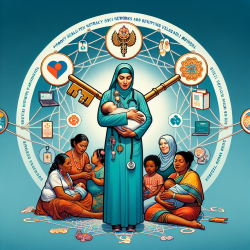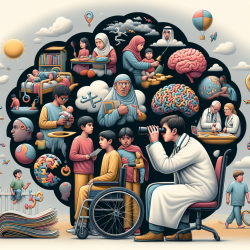In today's rapidly evolving healthcare landscape, practitioners face the challenge of effectively communicating health information to diverse populations. One group that often requires special attention is vulnerable new mothers, particularly those from minority backgrounds. A recent pilot feasibility study titled Considering Health Literacy, Health Decision Making, and Health Communication in the Social Networks of Vulnerable New Mothers in Hawai‘i: A Pilot Feasibility Study sheds light on how health literacy and social networks can be leveraged to improve health outcomes for these mothers. This blog will explore key findings from the study and offer practical strategies for practitioners to enhance their skills and support vulnerable mothers more effectively.
The Power of Health Literacy in Social Networks
Health literacy is a critical factor in determining health outcomes. It refers to an individual's capacity to obtain, process, and understand basic health information needed to make informed decisions. However, the study highlights that health literacy is not just an individual trait but is deeply embedded within social networks. For vulnerable mothers, especially those from Native Hawaiian and Filipino communities in Hawai‘i, these networks play a crucial role in shaping health behaviors and decision-making processes.
The study found that these mothers often relied on a small network of trusted individuals—primarily family members such as partners or mothers-in-law—for health-related discussions. This reliance underscores the importance of understanding the dynamics within these networks to tailor interventions that enhance health literacy collectively rather than focusing solely on individuals.
Implementing Research Findings into Practice
Practitioners can draw several actionable insights from this research:
- Cultivate Trust: Building trust within the community is paramount. Engage with community leaders or trusted figures who can act as liaisons between healthcare providers and vulnerable mothers.
- Leverage Social Networks: Encourage mothers to expand their health discussion networks by including peers or community health workers who can provide reliable information and support.
- Cultural Sensitivity: Tailor communication strategies to resonate with cultural values and norms. For instance, storytelling interventions have proven effective in Native Hawaiian communities.
- Use Technology Wisely: While face-to-face interactions are invaluable, technology can supplement these efforts by providing accessible information through mobile apps or online forums.
The Role of Practitioners in Enhancing Health Literacy
The study emphasizes the practitioner's role in fostering an environment where health literacy can thrive within social networks. By understanding the unique challenges faced by vulnerable mothers—such as limited access to healthcare resources or low educational attainment—practitioners can design interventions that are both effective and culturally appropriate.
A critical aspect is recognizing the potential barriers these mothers face when accessing healthcare information. Practitioners should strive to create inclusive spaces where questions are encouraged, and information is presented in a clear, understandable manner. Additionally, training programs for healthcare providers should include modules on cultural competence and effective communication strategies tailored to diverse populations.
Encouraging Further Research
This pilot study opens avenues for further research into how social networks influence health literacy among different demographic groups. Future studies could explore larger sample sizes or longitudinal approaches to understand how these networks evolve over time and impact long-term health outcomes.
The insights gained from such research could inform policy changes at institutional levels, ensuring that healthcare systems are equipped to address the needs of socioeconomically vulnerable populations effectively.
A Call to Action for Practitioners
The findings from this study serve as a call to action for practitioners working with vulnerable populations. By integrating the principles of health literacy within social networks into their practice, they can significantly impact maternal and child health outcomes. As we continue to strive for health equity, let us harness the power of community connections and cultural understanding to empower every mother on her journey towards better health.










